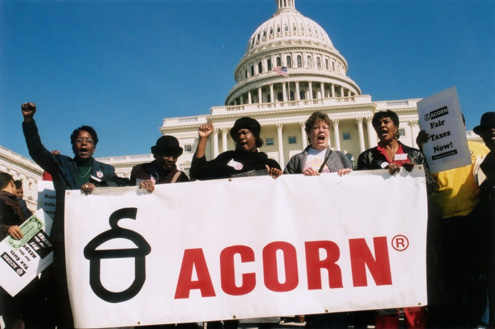As Fiscal Year 2010 finally begins, a judge has struck down Congress’ law ending federal funding of ACORN. It’s ironic in that de-funding ACORN was the only example of fiscal restraint we’ve seen from Barack Obama, even more so since he’s now stacking the courts with judges that will continue to issue such rulings. And perhaps that’s what he’s wanted all along.

ACORN has shown America what the audacity of hope really looks like. In the aftermath of the videos showing ACORN employees engaged in conversations that should have triggered a federal racketeering probe for tax fraud and underage prostitution, Congress reacted to the overwhelming public revulsion to ACORN by enacting a federal law blocking ACORN from receiving any more of your tax money.
In a brazen display of their lack of shame, ACORN audaciously sued the federal government, asserting that depriving them of federal funds was unconstitutional because it’s a bill of attainder. They shopped around for what they hoped would be a friendly court, and filed the suit in Brooklyn.
On Dec. 11, Judge Nina Gershon of the U.S. District Court for the Eastern District of New York issued a preliminary injunction blocking Congress’ law as unconstitutional, requiring the government to keep giving ACORN your money. In a twenty-one page opinion, the judge explains the law is a bill of attainder, therefore that ACORN will ultimately win the lawsuit, and so must continue receiving federal funds now.
Most people (and many lawyers) have never heard of a bill of attainder. They come from the British system. For centuries and through the colonial days, Parliament could pass a resolution declaring a particular person to be guilty of crimes, usually treason against the king. Such an action is called a bill of attainder.
So in Article I of the Constitution, the Founding Fathers forever barred bills of attainder in this country. This clause guarantees that no one can be criminally punished without a trial.
But this law is not a bill of attainder. First, a bill of attainder must be directed against specific individuals. This law is directed against a nationwide corporation and its corporate affiliates.
Second, a bill of attainder involves a legislative finding of guilt and then inflicts punishment. This law implies no guilt, simply saying the government shall no longer grant money to the group.
This is not punitive in a legal sense. No one is entitled to taxpayer money. It’s the ultimate entitlement mentality to assert otherwise.
If this precedent were to stand, then anytime a group has a government contract, and then the government doesn’t renew that contract after the group earns some bad press, then that group could sue the federal government to keep getting money. There are multiple Supreme Court precedents upholding laws where federal money was denied to certain groups, which the district court here casts aside.
The irony is incredible. De-funding ACORN was one of the only issues where Barack Obama showed any fiscal restraint. Now a judge has struck down this singular example of wisely conserving taxpayer money.
This irony then compounds to Shakespearean levels, because this court opinion was exactly the kind of activist decision you can expect from the judges Barack Obama is appointing to the federal courts. Legally speaking, this was mainstream-liberal, not extreme-liberal. There’s a weak–but cogent–argument that laws like this one are unconstitutional that many liberals would accept, as this court did.
If Obama appears to be crying over this decision, then they’re crocodile tears, because this holding allows his longtime friends to continue getting your money with an exertion of judicial activism.
It’s noteworthy that in discussing the Bill of Attainder Clause of the Constitution, the district court failed to discuss at all the Appropriations Clause. That provision states that, “No money shall be drawn from the Treasury, but in consequence of appropriations made by law.” In other words, only Congress can dole out federal dollars.
The court fails to consider whether it has the authority to order the executive branch (the Treasury Department) to continue giving federal dollars to ACORN after the legislative branch (Congress) with sole possession of the power of the purse has specifically passed a law barring any such appropriation. This opinion doesn’t even raise the separation-of-powers issue of a court dictating federal spending.
ACORN v. U.S. is an example of judicial overreaching. It reflects a liberal view of the Constitution, which means this ruling probably reflects Obama’s personal beliefs–which are consistently liberal–on the legality of the de-funding measure.
It is yet another form of Obama’s circumventing the constitutional system to enact such measures, but then create courts that will undo them.
This particular ruling can be immediately appealed even before the case is concluded in the district court, and the Justice Department filed a notice of appeal on Dec. 16 to pursue this option.
The ruling must be reversed on appeal to the Second Circuit. No taxpayer money for ACORN.
Ken Klukowski is a fellow and senior legal analyst with the American Civil Rights Union.
Ken Blackwell is a senior fellow with the Family Research Council and serves on the board of directors of the National Taxpayers Union and the Club for Growth.
COMMENTS
Please let us know if you're having issues with commenting.